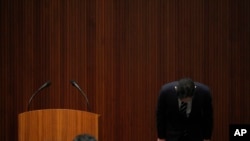Samsung heir Lee Jae-yong on Wednesday expressed remorse but did not admit to wrongdoing over his alleged involvement in a 2016 corruption scandal that spurred massive street protests and sent South Korea’s then-president to prison.
The vice chairman of Samsung Electronics, the world’s biggest producer of computer chips and smartphones, promised Wednesday to end heredity transfers of control of South Korea’s largest business group, promising not to pass the management rights he inherited from his father to his children.
Lee also said Samsung would stop suppressing employee attempts to organize unions.
Lee’s news conference followed a review by a Samsung committee of external experts, led by former South Korean Supreme Court justice Kim Ji-hyung, of Samsung’s corporate behavior. It concluded he should apologize over the graft allegations and address problems with the company’s labor policies.
“Samsung’s technologies and products are continuously praised as top-rate, but people’s views on Samsung remain critical. All this is because of our shortcomings,” Lee said as cameras flashed at a Samsung Electronics office in Seoul.
Lee said the company “at times” had failed to comply with laws and ethics. After bowing in apology, Lee vowed to ensure “there would no longer be any controversy over the issue of management succession.” He left without taking questions.
Lee stepped into his leadership role after his father, Samsung Electronics Chairman Lee Kun-hee, fell ill in May 2014.
He is being tried on charges that he bribed former President Park Geun-hye and her confidant while seeking government support for his control over the Samsung business empire.
The scandal ignited massive street protests that toppled the presidency of Park. She was formally removed from office in March 2017 and is serving a decades-long term in prison.
Samsung’s union-busting practices have been criticized by activists for decades. As Lee spoke, former Samsung employee Kim Yong-hee continued a near yearlong protest atop a 25-meter (82-feet) traffic camera tower nearby, demanding his job back. Kim says he was fired in 1995 for trying to organize a labor union.
“(I) offer a sincere apology to every person who has been hurt by Samsung’s labor union issues,” Lee said, without directly commenting on Kim or his protest.
“From now on, (we) will ensure that there’s no more about a ‘union-less Samsung,”’ he said. Samsung will protect workers’ rights to organize, bargain collectively and strike, he added.
Samsung launched the review of its business practices after a Seoul High Court judge overseeing Lee’s bribery case faulted the company for he saw as a murky management culture. He said the company should set up an oversight system to monitor its management.
Lee was sentenced to five years in prison in 2017 for offering 8.6 billion won ($7 million) in bribes to Park and her longtime confidant Choi Soon-sil while seeking government support for a merger of two Samsung affiliates. It went ahead despite opposition from some shareholders and helped cement Lee’s control over Samsung Electronics, the crown jewel of the family’s corporate empire.
Lee was freed in February 2018 after the Seoul High Court reduced his term to 2 ½ years and suspended his sentence, overturning key convictions.
However, in August the Supreme Court sent the case back to the High Court, saying that the amount of bribes Lee was judged to have offered was undervalued.
Some legal experts say Lee could be sentenced to another term in jail if convicted for a higher amount of bribes. Prosecutors claim the funds were embezzled from Samsung’s corporate coffers.
South Korean corporate leaders often have gotten relatively lenient punishment for corruption, business irregularities and other crimes, with judges often citing concerns for the country’s economy.




